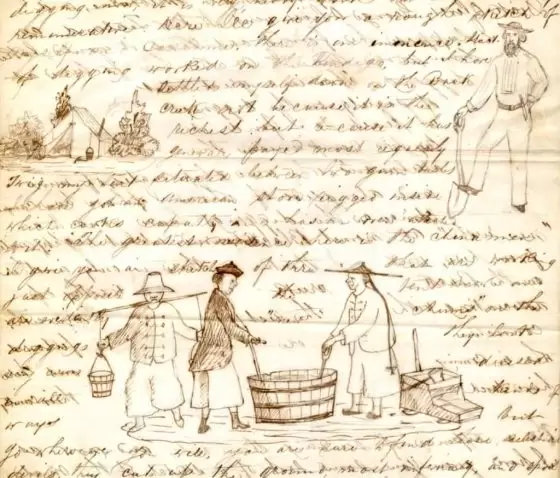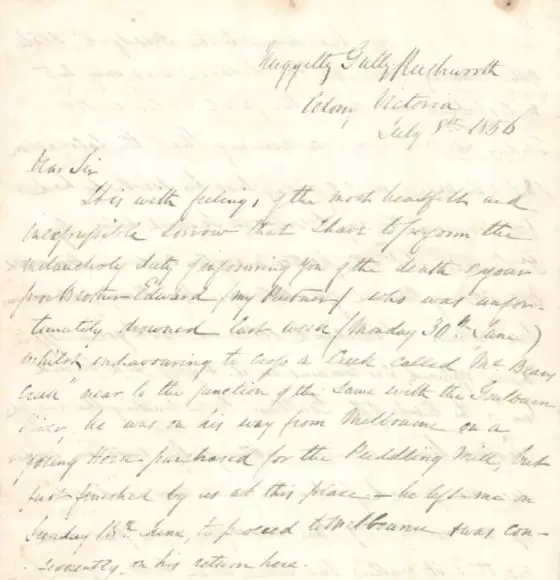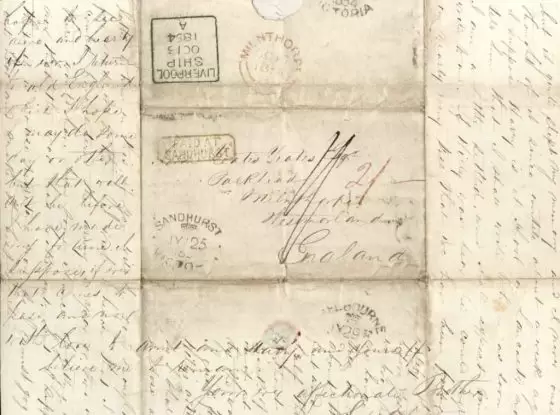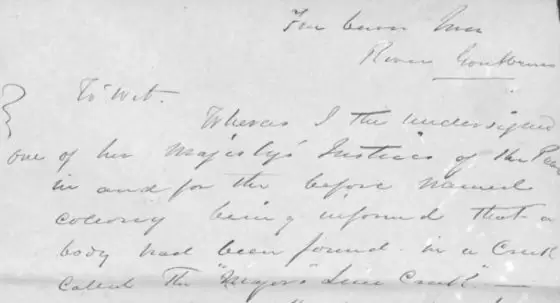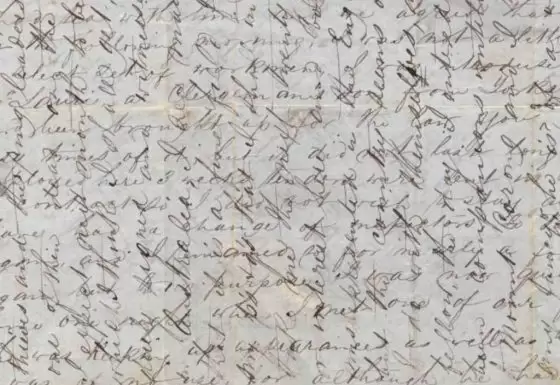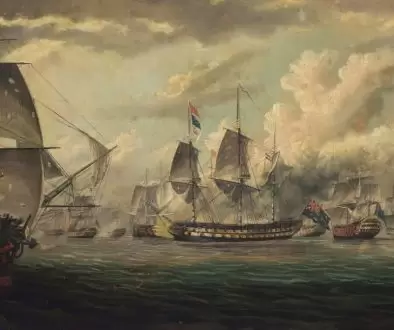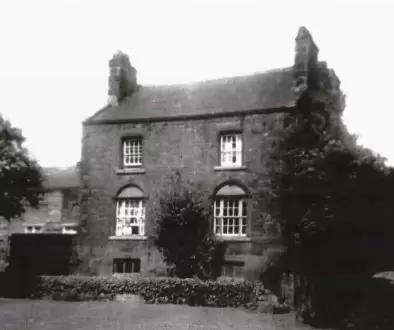The Mysterious Death of Edward Yeates
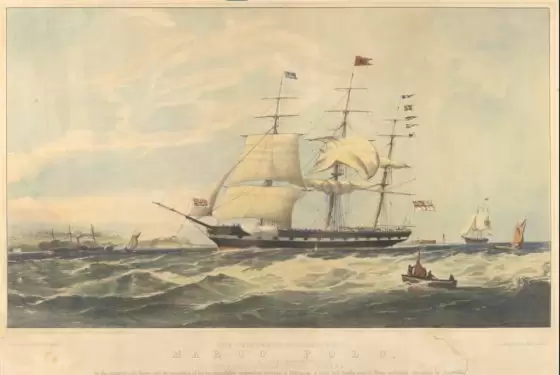
April 2023 Update
Edward Yeates
Edward Yeates was born Edward Richards on 31 January 1833, at Park Head, Levens, Westmorland, England. He was the fifth child of John Yeates and Margaretta Brettargh, and the older brother of George Yeates. who was known as Harry to the family. The whole family changed their surname to Yeates in 1837 as a condition of his father inheriting the estate of Anthony Yeates. In 1836 Edward’s father was Lord Mayor of Kendal, then in 1839 the whole family moved to live in “Frankfurt am Main” in the Maintal district. Both his parents died within a few weeks of each other in late 1847, after they had returned to Kendal.
On Sunday 13th March, 1853 at the age of 20, Edward embarked on the Clipper Ship “Marco Polo” in Liverpool and set sail for Melbourne, seeking to make his fortune in the Land of Gold. This article has been written from letters that Edward sent home to his eldest brother John Yeates Yeates, who was now head of the family in Park Head. I have quoted at length from these letters, but thought it best to let Edward tell his story in his own words. He wrote his first letter home from the “Marco Polo”. This letter was transferred to the Dutch Clipper “Erasmus” near the equator. Scans of the original letters and transcriptions of them are available for download at the foot of this page.
Edward described his journey:- On the 24th our first death occurred; a child 6 months old, son of Francis James Hilton Esq. a gentleman in the 1st cabin and it was buried the same evening. On the 28th we lost a poor girl. It was a most melancholy case. It was when we had been out about two days she went into her berth, as she supposed, after the lights were put out. It so happened that it was the wrong one, and she put her hand onto a man, which so frightened her that it sent her silly. She was continuously screaming and would eat little or nothing. Poor girl, it was a relief when she died. She was buried the same night and a very solemn sight it was for it was the roughest night we have had yet.
Arrival in Melbourne
The remainder of the voyage was as but a repetition of the account I gave you. I had capital health on board never been once seasick or even feeling so. We arrived at Melbourne on Sunday, 29 May but I did not manage to get all my luggage out of the hold until 3 June, so that I was delayed getting on shore until 4 June.
The first thing was to get my boxes stored which I did although not at a very reasonable rate, but of course I did not expect everything very cheap in this land of gold. The next thing was to get something to eat, so at the Melbourne Larder I ordered a beef steak and potatoes which I thought uncommonly good for we never tasted an ounce of fresh meat from the time we left Liverpool to that of our landing.
I certainly felt rather lonely in the city of Melbourne without a single person I knew, excepting some “Marco Polo” friends or house acquaintances I did not think worth cultivating but however after dinner I had a glass of good ale in which I drank your very good health and many happy returns of the day to you and then set out to the town.
Well I carried on for about a week longer, when after applying for every situation that was advertised in the Argus newspaper without success. I walked off to Le Hardy’s Beach in a pair of fustian trousers, Jim Crow had, and started as carter, so there I was with two horses in a dray and a long whip, carting timber from the beach.
The reason for my going there was to be in Melbourne as little as possible, not that I ought to be ashamed of it for now I found many of the most respectable people that I have met have begun just in the same way, indeed it is easily explained, the working classes go off to the diggings and there is no one left to fill their places excepting such unfortunate fellows as myself who come into a colony like this to make rapid fortunes.
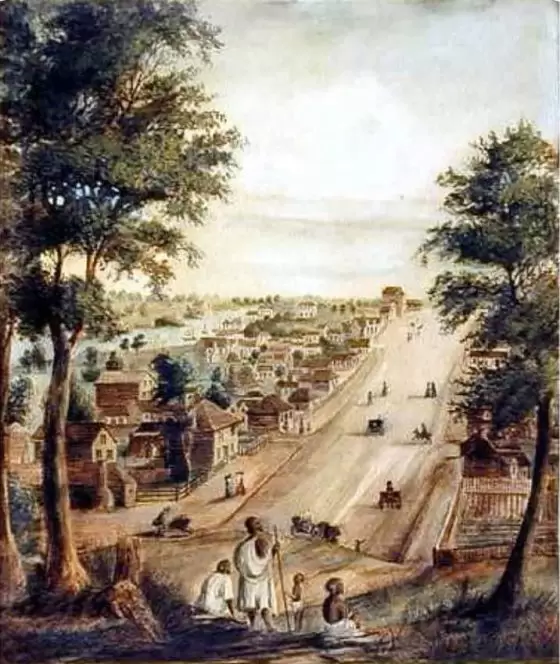
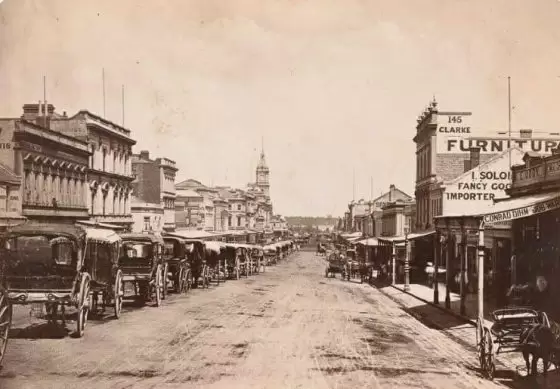
Inspector of Roads
I did not find myself too strong after a sea voyage and bad diet. So one day as I was with the cart up towards St Kilda with some goods for one of the Inspectors of the Roads who seemed to be a very nice person and to know in a moment how I was situated.
This gentleman after making a few remarks about the disagreeable employment I had got, asked me into the house where he gave me an account of three or four friends of his who all had at first been situated in much the same way as myself but who at that time were doing very well in Melbourne before I went.
He offered to take me onto the roads he told me that he has got a very select gang on a road a little way in the bush where I should not have much to do. We found with tent, wood and water and that I should then have more time to look about me. This I thought very kind of him for generally the people here are a selfish independent set, so I accepted his offer, and accordingly called on him during the following week.
He received me very kindly I had tea with him and we agreed that I should go with him on the following morning. I was not a little astonished to find such a select set of workmen. I was introduced to a Dr Mamel, a Dr Laurie, a clergyman’s son from Yorkshire and two others that had been brought up for the Law.
You would guess that we had pretty easy times of it, but it did not last long for before I had been employed here three weeks rendered we were sent into the Bush all the roads by contract, So I did not wish to stay any longer as we should have have had a change of inspectors.
Mounted Rifles, Victoria
So there I was all adrift again, and I remained so for nearly a fortnight trying the advertisements again but to no purpose. I was now quite at fault and was going by horse one night when I met one of our first class passengers who was keeping up appearances as well as he could, but he said it was of no use for although he had got so many letters of introduction etc he could not get any retention fit for him to take, he told me of another passenger that came out in the same berth as himself who had accepted a waiters place in one of the hotels.
So he had determined to enter the troopers at Richmond Barracks and for that purpose determined to see Mr Bourk. On the following morning, he wanted me very much to enlist at the same time, but I thought I would take a little time to reflect on it,
I fancied I should have preferred a shepherd’s place but after enquiring found that it was anything but an enviable one and in which I should not be able to see or hear anything that was going on which would not have done for me as I wished to have some idea how to lay out my money, when I get it, to the best advantage, so I decided to go next morning and make some enquiries at Richmond Barracks.
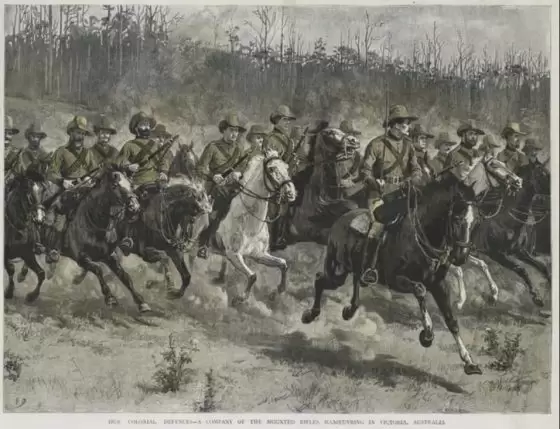
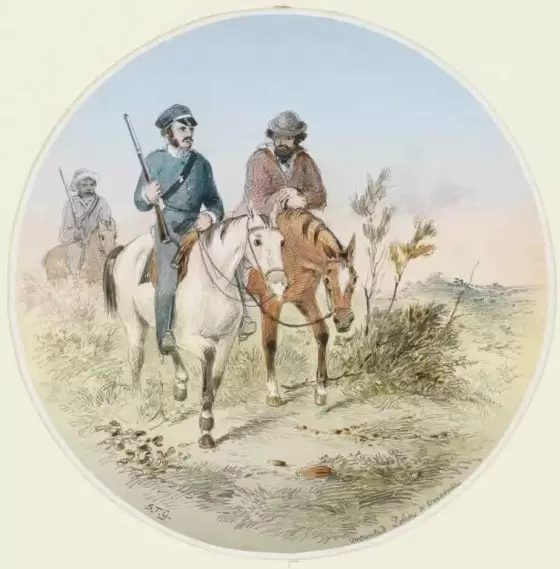
Mounted Police
This force is a sort of cross between a mounted policeman and a soldier, but notwithstanding consists of a mostly respectable set of young men. I introduced myself to some of them and stated my reason for being there, they gave me every information they could and said that I should be sure to get in if I had any good letters with me.
That afternoon I called on Capt. Bourk and he advised me to call on the day following and bring with me my letters or papers I could, as he said he had to be very particular as to who he admitted. I call accordingly, letters I told him, I had none to show, that the only paper which he could see who I was and where I came from was a Power of Attorney which I handed him, which after reading he handed me back and wrote a note to Lt Weston at Richmond which he gave me telling me that he would in all probability grant me a few days leave to get my things settled in Melbourne as we should be going up into the country very soon.
Mr Weston seemed a very nice person and through him I applied for a cadetship but was told that there were no vacancies but however after some trouble I got my name down for the first vacancy in the supernumerary cadets, little as this was it was something, I soon found out that there was but very little difference between a cadet and a trooper (only the name) they had to clean their own horses and kit just the same as the rest of us as well as the drill and parade with us.
I was only at Richmond a week or 10 days when 25 of us were ordered off to Bendigo diggings, as they expected the diggers to stand out against paying any licence at the same time the 40th regiment was ordered off to the same place.
Journey to Bendigo
I must now give you a sketch of our journey although it was not a very long one. Two days before we started I had my choice of horses out of a lot that had just been brought in from the Bush as wild as ever they could be.
I chose a young iron grey that had never had a saddle on his back before and you may suppose that I had enough to do for the two days he nearly broke my neck twice, but however we started in sections of threes off to the Treasury where we were joined by our lieutenant it was a miserable wet day, and the road with the exception of about 6 miles out of Melbourne are wagon tracks over swamps and marshy ground.
Notwithstanding these difficulties our horses were fresh and we managed to get to the Bush Inn a distance of 35 miles. So far there is little or nothing worth recording, the Wheeler Plains which we had crossed was more like a desert than anything else.
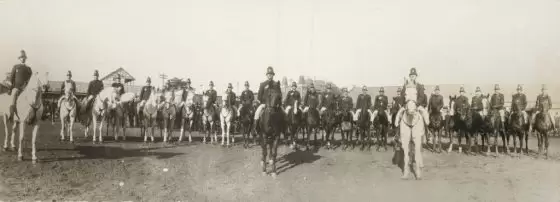
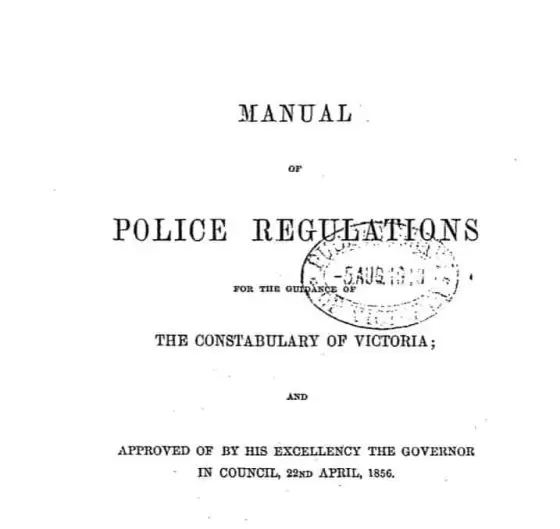
River Crossing
The next day started at 5 o’clock in the morning and soon got to the Black Forrest. The roads here are worse than ever, the mud was up to our horses girths at times. The trees are a pretty good size, but hardly anything else than gum trees and crow bark and here and there thick clumps of underwood.
We passed many parties both going to and coming from the diggings of which we had various accounts some told us that they were in a complete uproar other again that they were uncommonly quiet but that they were making every perturbation to oppose the government, indeed we had so many accounts that we could give credit to none of them.
After about 12 miles ride through the forest we again broke out into the open country and after climbing over all rock and hills we came onto another land of Plains in the middle of which was a river or more properly speaking a swollen stream, which was deep enough however to make our horses swim.
We soon got over this difficulty although some of the young horses were very timid as for the one I rode when he found that I was determined to go across made a bound right into the middle of it like you see a dog going into a pond after a stick; consequence was that both the horse and myself went right over head but I took hold of him by a lock of his mane and his ears so he soon brought me out. I came at the other side and as I was one of the first across I had the pleasure of enjoying the misfortunes of others all of whom had had a hearty look at the disappearance of me and my horse.
The Australian Gold Rush
It is now exactly 12 months since I was here last, but the place is much altered, that I might as well never have been here at all. I walked down from Bendigo in three days, which I don’t consider very bad work, in the state the roads are at present.
The diggings are at present very slack in fact there is little or nothing doing, In consequence of the want of water, before I started I got about an acre and a half of land set with potatoes and about half an acre with other vegetables, and I am in hopes that they will turn me out about two hundred pounds and clear the expenses as well.
If so I shall not complain, if I live so long. I intend then to sell my share of the land and come and settle down somewhere nearer Melbourne, where I am sure I can very soon double any time that I may have at hand.
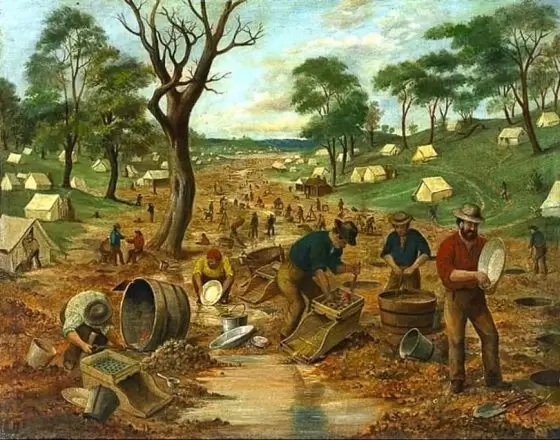
Bendigo Diggings
I should so like to see you and Bill with your moustaches and beards you must look rum customers, and yet I suppose that I look quite as rum for of course I never shave indeed it is very few that do here.
I am now digging and find it the most pleasant occupation that I have been at yet, it is the most independent and although the gold may not come in so regularly, yet in the long run I think it will be the most remunerative.
Bendigo is very much improved since I came here instead of tents there are now very good substantial stone buildings now such as churches, banks and stores but business is in a shocking dull state and every day there is a fresh “Smash” as it is colloquially termed. A case in the Bankruptcy Court, owing I suppose to the inferior yield of the gold, to what has been.
They are beginning to work the quartz reefs now with great spirit in this district and crushing machines are going up in every direction. I have been prospecting several reefs about here lately and think I know one now that will pay, but it requires a little capital to begin and I lost nearly all I had with that infernal piece of ground but thank goodness I have sold out now though at a loss of £23 besides labour and time, but it can’t be helped now and so I shall buy something elsewhere.
Regrets
I was much obliged to you for the Mercury’s which you sent me, you may depend upon it. I devoured them with great gusto especially the local news. I do not mean by that that I do not feel interested in the war news for I’m sure every English man must.
I only regret that I did not enter the army instead of coming out to this colony. But regretting is not part of my creed, at least shall not be. I shall work with my tub and cradle until I can make some money and then make a stroke at something else.
When I left my Australian estate I was down to my last shilling so I thought it time to stir myself and leave the potatoes, cabbages et cetera et cetera to take their chance. You will wonder how the deuce I managed to raise the wind, but I wrote a few lines on the same night. I will enclose it, it will show you that no man need suffer that chooses to work.
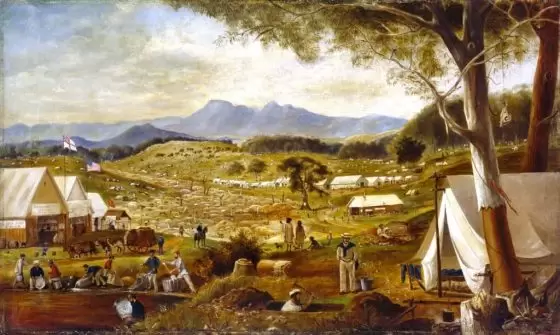
A Poor Breakfast but a Good Dinner
T’was on a Winters evening, my daily toils were done
and as within, my tent so thin, I thought myself alone
I laid me down upon my bed, to sleep I was not willing
for what I’d spent, and what I’d lent, I’d only one last shilling
The next days grub I had to get, but how I did not know
I could not prig, I’ll have to dig, to some gully I must go
at the bottom of the Sheep Wash Creek I think there’s something yet
so with my cradle, if I’m able, I’ll try what I can get
The morning came, and with the dawn, I started with good will
to try to find, those things that shined, my belly soon to fill
Twelve hoppers, yes, or more went through, but very little gold
stopped on the slide, and then I sighed, for I was wet and cold
The next one now, I did begin, though I was getting thinner
I want the price of something nice in fact I want my dinner
and now into the slide again fix my anxious stare
and to my surprise, before my eyes, little nuggets thick lay there
Another and another, I’ve hit the spot I see
and in an hour, or little more, I had of ounces three
so to the nearest restaurant, I went you may be sure
and since that day, I safe can say I never was so poor
Edward Yeates
Way of Life
At any rate you will hear from me again soon; our mode of living here would rather astonish some of you English people that are so fond of comfort. Our house is a small calico tent, our beds are made of two poles with a couple of sacks nailed across them, we live principally on mutton and damper [NB damper is an Australian soda bread, made without yeast] with the addition of tea, which beverage we drink a great deal of, when we can get a chance shot at a turkey he makes a capital feed for us, or a couple of ducks if we fail to get either of these.
We can always get plenty of parrots and wattle birds as which make excellent pies. The worst things about here are the wild dogs, native cats and possums. As for the latter you cannot wake up in the night without finding one or other of them either on your bed or up the tentpole trying to get at the meat, damper, candles or anything they can eat.
The dogs do not annoy us as much although they kick up a dreadful row in the night howling. Snakes are very plentiful in the summer time especially about the creeks, I killed one last summer while riding, with my whip, it measured 9 feet, what they call the black snake, a native black man told me that it would make very good eating but I did not like to tackle it and offered it to him, but he gave me to understand that he never eats them unless he killed them himself.
I do not know whether you will be able to make out all the scrawl for the bush accommodation is very bad I am now writing this on the leg of a long boot laid across my knee for the want of a desk. But as soon as we can get the hut up which we are beginning to build I shall have my boxes up to so that we shall get more comfortable by degrees.
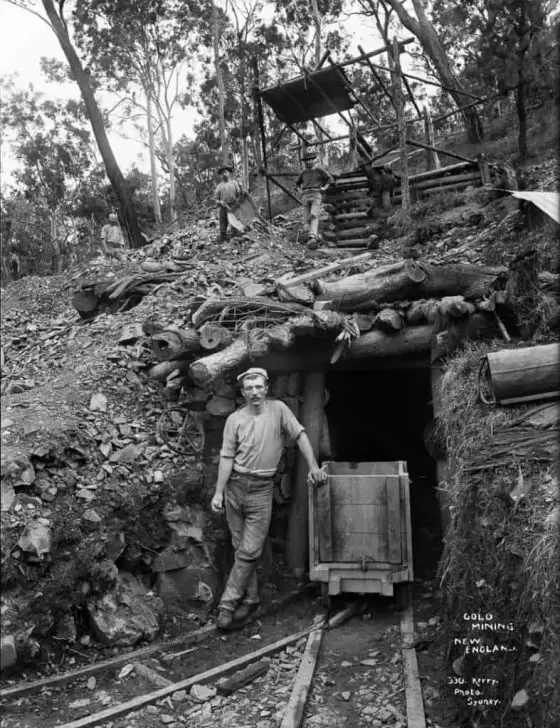
Letter to his Brother William
I am digging now it is very heavy work but at times very remunerative. Here I’ll give you a rough sketch of myself on a cash mean. There is an immense blast of digging work on the Bendigo, but I have settled myself down on the Back Creek not because it is the richest but because it has generally paid most regularly. My tent is situated between two gum bushes I have got an American stove rigged inside which cooks capably and has an oven attached to it.
The greatest nuisance here is the China men I give you a sketch of those that were working opposite the tent and are evidently new on the diggings. They look very curious dressed all kinds of ways but go where ever you will, you are sure to find those celestial devils, they cut up the ground most inferior early and spoil a great deal of workable ground by overflowing it with water which is a very scarce commodity especially in the summer months.
Last summer we had to be up before sunrise and go with a bucket and panic in and mop up as much as we could but I certainly cannot complain about it now for we are all but swamped out. The diggings are crowded with all kinds of machines for both puddling and quartz ores bring for it is soon hard to find places to pay the pick and shovel digger.
Aboriginal Men
About half a mile from where I am camped there are about 60 aboriginal natives staying. They often come down the country in gangs like this to beg and pick up gold, which they invariably buy out in grog and return to their mie-mie’s which are little miserable huts built of branches and leaves which they live in, here they polish off the brandy and then begin to dance and shout and fight; this row they will invariably keep up until daybreak.
Taking them all together they are a harmless idle set of fellows and have been very much corrupted in their morals by the white people. They most of them take European names with some little affected such as King Billy, Queen Betty, Prince Peter and Princess Wanga-Wanga.
This latter had what I should say was a worthy descendant of some British digger being very young and other much lighter complexion than the rest and good featured with all, I had some conversation with the aforesaid “King Billy” who is rather an intelligent fellow.
Amongst other things he told me that since the white men had taken away their country they have always in their tribe killed the female children as soon as they were born, on enquiry I found that this was in consequence of their young women being invariably seduced by the white men I asked him if they followed the same practice in other tribes.
When he told me that they did I told him that it was a most barbarous affair and that they might all be hung for it but he only replied “Black man been fool too long, be fool no longer”.
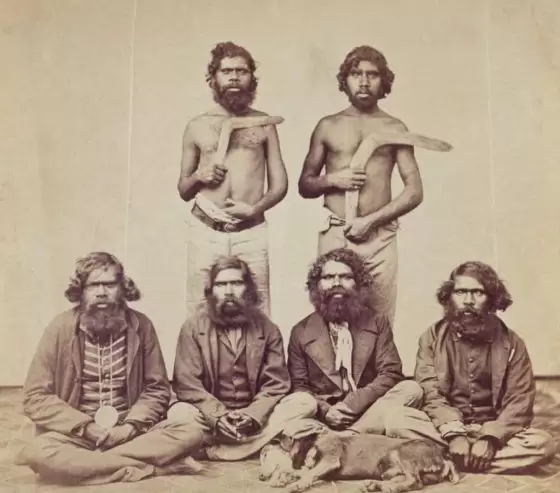
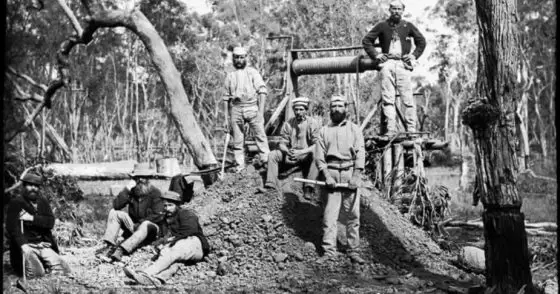
Thomas Finlayson
I must say that gold is the only attraction left. Tom Finlayson is the only person that I correspond with in Melbourne, he always sends my letters up to me and I have them all directed to him, he has got a very nice little place at Prarhan near Melbourne. I dined with him twice when last in town he brought his sister out with him who was in a decline.
I have marched a good many miles and at last settled down on the Goulburn diggings [Nuggetty Gully, Rushworth] about hundred and twenty miles from Melbourne. I have there put up a machine for washing gold by horsepower, and as horses are bringing an exorbitant price up in that part of the world, I was obliged to come down again for one or two more, so that this accounts for my being in town again so soon.
I have laid out every penny of the little legacy in the above-mentioned machine and cannot reproach myself for spending a single pound foolishly so you will say that there is great reform in me. I said that all my money had been spent in erecting this machine.
I must also tell you that the horse that I have now bought and which will take me up country tomorrow (value £60) has been bought from the proceeds of this machine over and above expenses, so that I have not been idle since I last wrote.
Receipt of Legacy
I am only going to write this just to acknowledge the receipt of your letter containing the Bills of Exchange, which I’ve also got changed into money and safely lodged Union Bank of Australia in my next which will be dated from Bendigo, when I shall have more window, I will be able to let you know what I propose doing with my little legacy.
It won’t go very far in this country but however I must do the best with it I can, I was very sorry to hear your account of will I felt almost jealous that he would make a better use of his than I should be able to do with mine, for although we have been both of us launched into the world long since, still this legacy seemed to be the only rope that held us safe, now that this road is cut of course we are adrift altogether and must either make a good or a bad voyage.
If I make the former I may see England again.
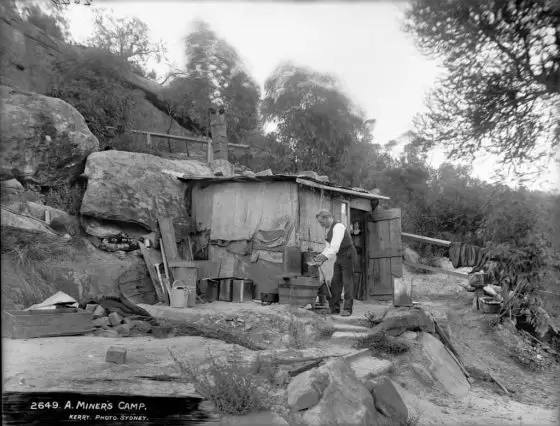
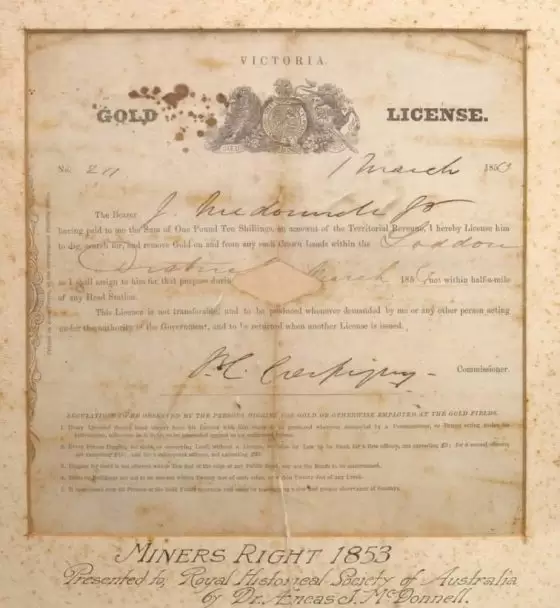
Letter from John Yeates Yeates to his brother Edward
Take care of your money my dear brother and it will be of use in an hour of need. I shall be most happy when I hear from you again to say all is right.
I am looking forward to a letter about the middle of July to hear of your welfare and trust you will prosper with good cold luck.
I hardly know how to commence my budget of news and when I shall know how to end it. Lucy and I are the only occupants of Parkhead and the servants as Harry is still at Lancaster School [Lancaster Royal Grammar School] from which I intend to remove him this Midsummer. He has expressed a great wish to join the Royal Marines and I am going to try to get him a cadetship at Portsmouth after he has been with me about six months.
I mention this because I can teach the best part of the drill make him hold himself up “eyes right and eyes left” teach him the recovery exercise. I have already these last Easter holidays put him through a course of geography logarithms and I feel sure he will pass for the entrance examination on board the “Excellent” Gunnery ship. They are very strict in that department and woe betide unlucky youngsters who is turned back.
Letter from Lowson Salmon about Edward’s Death
Nuggetty Gully, Rushworth, Colony Victoria
July 8th 1856
It is with feelings of the most heartfelt and inexplicable sorrow that I have to perform the melancholy duty of informing you of the death of your poor brother Edward (my partner) who was unfortunately drowned last week (Monday 30th of June) whilst endeavouring to cross a creek called “McBean Creek” near to the junction of the same with the Goulburn River. He was on his way from Melbourne on a young horse purchased for the puddling mill but just finished by us at this place. He left me on Sunday, 15 June to proceed to Melbourne and was consequently on his return here.
I did not hear of the melancholy accident until Thursday, 3 July when accompanied by my other partner, I drove off, but owing to the dreadful state of the country although the distance was only 25 miles I did not reach the fatal water until Friday at midday; on arriving I had the satisfaction (but an unhappy one) of finding that his poor body had been recovered the day before and an inquest held by Dr Lumsden JP the particulars of the evidence forwarded to the attorney general of the colony. His body not having been interned I identified and claimed it.
I got a coffin made and placed his remains in it myself and buried him on the banks of the Goulburn River, reading the Church of England service over him. Although he rests in unconsecrated ground (a matter quite unavoidable up the country here) I am sure you will feel with me that it matters but little what becomes of the frail and perishing tenement, when the immortal spirit has winged its flight to its heavenly Father.
Thomas Finlayson’s account of the death
It is with great reluctance and with sad and sorrowful feelings that I now address you, to inform you of the melancholy death of my dear friend your brother Edward who was drowned while crossing a creek on the 30th Ultimo [the previous month], and I enclose you copies of documents from which you will see all that has been done. He came to town about 14 days before (to purchase a horse) and remained with me till the Wednesday previous, left in perfect health and high spirits. He had every prospect of succeeding in the world he having become very steady and persevering and one of his remarks to me a short time since was “that the hardships he had undergone since coming to the colony had made him a changed man”. To me he was almost a brother and indeed, had he lived would have been so he having been engaged to my sister, and he would have married her had I not objected to him taking her to a tent and when he left it was agreed he would build a wooden house. My poor sister has suffered more than language can convey and for the last two weeks her medical attendants almost despaired of her reason but thank God she is slowly recovering.
What amount of property he may have left I cannot say and you must entirely depend on his partners for that information (his partner as you will see is to write to you). He however said to me that the machine entirely belong to him and I am sure his partners had no money when he received the remittance from you about 10 months since as he sent £10 to keep them he having resided with me for a month then, he spoke of his partners as honourable men and placed the utmost confidence in them but did not seem acquainted with their previous history except that Lowson Salmon (the one who is to write you had been extravagant and that his estates in England were held for his creditors) I intend visiting his partners in about two months and will endeavour to have poor Edwards body removed to a graveyard and I would like to know if you would wish a stone erected at his grave.
Salmon confirms that Edward had been robbed
Touching the manner of Edward’s death I am quite convinced that the Italians had nothing to do with it the steepness of the bank where he attempted to bring his horse out was quite sufficient to account for his being thrown back over, and having heavy leggings on he was unable to swim, with respect to the blanket he had rolled in front of his saddle I am not so clear the articles it contained were invaluable to a bushman, (illegible) there was a great deficiency in his money,
I can however gather no information. The horse was caught 9 miles down the river before I even knew of the accident, at Mr Banks and gentlemen who owns 15 miles of frontage on the Goulburn River and who rendered me every assistance in his power but without result. The money Edward had on him was not the earning of the mill but the price of a nugget of gold found by my other partner Richard which digging with pick and shovel but of course common property.
Official documents are difficult to collect in a place like this, which although a declared town but containing no magistrate, no solicitor, no clergyman, no church or consecrated graveyard not even a single policeman or recognised authority of any description except the loading Heathcote [???], 35 miles distant.
I shall however do what I can as I suppose I am the only person who can prove his burial, having taken his remains and placed them in the coffin myself. If God spares my life it is my intention to be at home again in the early part of next year when perhaps I may be better able to meet any of the nice acquaintances of the English law, not to be done just in a state of society but little removed from the savage prowling account.
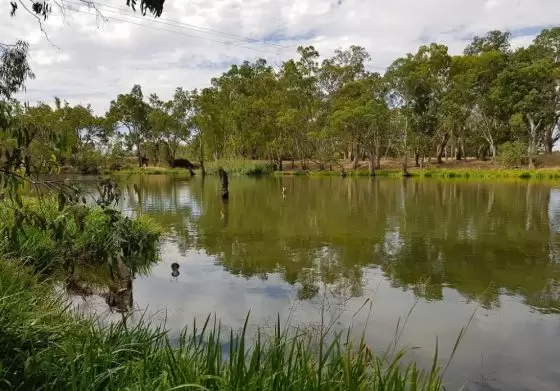
Edward Yeates’ Inquest 3 July 1856
Edward Yeates died on the 30 June. The inquest was held on the 3 July at the Freeburn Inn, River Goulburn. Edward had spent the night before his death at the same inn and had been recognised by a labourer who lived at the inn and who also found his body at the crossing point. He was also recognised by the cook of the inn, both of whom gave sworn statements at the inquest.
The Freeburn Inn in Mitchellstown was owned by Donald McBean, presumably a descendant of Clan MacBean of Tomatin, Inverness, Scotland.
It was no doubt named after the famous Freeburn Inn, in Tomatin, which was built in 1745. In 1639, James, Earl of Moray granted a Charter to Bean McBean, and the McBean family lived at Tomatin House from 1639 to 1926.
Confirmation that the body was Edward Yeates
The attached extract from the inquest report confirms Lowson Salmon’s explanation of identifying Edward’s body at the inquest and claiming it for burial. He says that he had a coffin made and buried it on the banks of the Goulburn River.
It would be nice to know the location of the Freeburn Inn, Mitchellstown as that would tell us where Edward’s final resting place is to be found. We know that it is in the vicinity of Mitchellstown, on Donald McBean’s land, but south of Major’s or Mitchell’s Creek and on the banks of the River Goulburn.
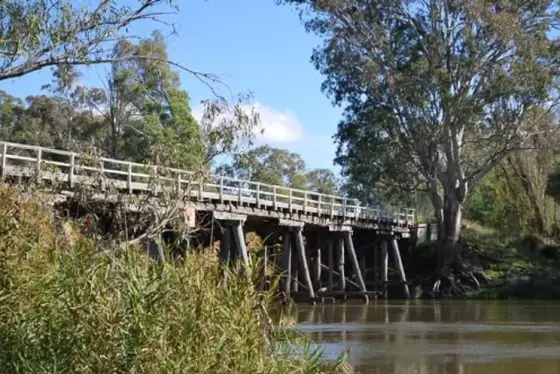
Thomas Finlayson’s Story
He states that “the mill has been a ruinous failure and as I am worse off than I was nine months ago in fact I have not been working it for some weeks, both horses are in a paddock at grass and this being the dry season and sale’s out of the question”
Such is the present state of poor Edwards affairs and I fear it will be some time before I can visit Mr S and from enquiries I have made I find it would be throwing away the machine to dispose of it at present. But as yet I do not know what I may do.
Dr Wilmot the coroner for Melbourne called on me about two months ago with two ladies (friends of your family) and offered to assist us wind up Edwards affairs, but having no authority to act for you I could not accept of this offer I intend however now to avail myself of his kind offer as from his position I hope he will save a great deal of time, I have called twice on him without meeting him.
When I do I will give him for perusal all the papers relating to poor Edwards death and get his opinion and advice and if possible get him to act with me. Could you inform me in course what legal document are required and I will have them sent you.
Finlayson reports that Salmon has disppeared
I send by this mail a newspaper containing a notice of Mr Lowson Salmon’s disappearance from Rushworth. I trust however he has long ere this accounted to you for the property left by your brother Edward.
The last letter I had from Salmon he stated that he had sent you the desk and that he had instructions from you to realise the property and remit the proceeds to you; this coupled with your continued silence to my letters led me to believe his statements to be correct but from what has now occurred, I fear I have been mistaken.
Little if anything can now be recovered but I will wait on the Bank Inspector so soon as he returns and will write you the result by next mail.
Salmon has not yet been found.
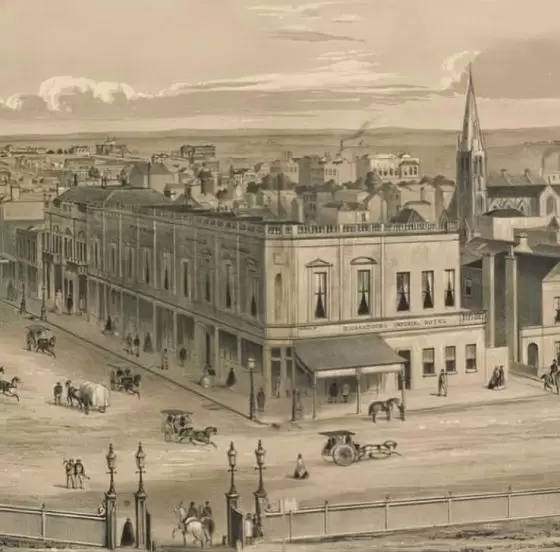
Postscript
The “Download Original Documents” button below will enable you to download a PDF scan of all the original letters. As you will see from the illustration opposite these letters have been cross written and are not easy to decipher, so a transcription of all the letters is included in the file.
Looking back over the events in this article I found it hard to believe that an accomplished horseman who had served in the Mounted Police should have difficulty crossing McBean Creek, or in deciding when it was unsafe to cross.
Secondly, my suspicions were further raised when I discover that he was robbed before he drowned in the creek.
Thirdly, Edward makes clear in his letter that he purchased the “machine” from his legacy, but Lowson Salmon in a later letter claims that it was his, alone.
Finally, Lowson Salmon raises suspicions even further by disappearing without trace, four years after Edwards death. Never to be seen again.
Original Documents
This article has been prepared from the Yeates Family Documents and Diaries, the original copies of these documents have now been donated to the Kendal Record Office and have been made available to the public for viewing or download.
